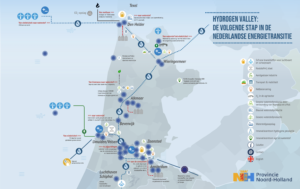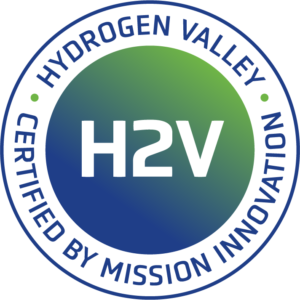Hydrogen Valley status for North Holland

Hydrogen development in North Holland has been awarded the European Hydrogen Valley status. The Hydrogen Valley status is a European award for regions that make distinctive efforts to develop an energy system based on sustainable hydrogen. On the aspects of “public-private partnership” and “financing,” the region is even named as a “best practice.
The application to obtain the status was submitted by the province of North Holland in cooperation with programmabureau Noordzeekanaal, New Energy Coalition and Ontwikkelingsbedrijf Noord-Holland Noord. With the granting of EU status, the region is officially part of the European sustainability program. This has the advantage that the region now has better access to knowledge and financing from Europe, which can provide an acceleration to make the energy supply more sustainable.
Great next step
Edward Stigter, deputy of the Province of North Holland and chairman of the Energytransition Steering Committee Noordzeekanaalgebied: “Granting the status of Hydrogen Valley is a great step, with this we can accelerate the sustainability of the region more. It is great to be able to scale up our plans for the province through the help of Europe. Hydrogen not only contributes to meeting the climate goals, but also provides cleaner air for our residents compared to fossil fuels.”
North Holland acceleration region
North Holland is ideally positioned for an acceleration region in the European transition to hydrogen. With IJmuiden, Amsterdam and Den Helder, the region has no less than three seaports that are important for the landfall, import, transport and storage of renewable energy. The seaports, combined with Schiphol Airport, the waterways, rail and pipe connections and connection to the national hydrogen network, function excellently for consumption in the region and the transit of renewable energy to neighboring regions and countries.
Within the region are several hydrogen production initiatives. North Holland is unique in its ambition for the use of hydrogen, in large- and small-scale application. From local projects and green hydrogen-based value chains (import, production, storage, distribution, use, export) in steel production, manufacturing, synthetic fuels, mobility and agriculture. The commitment to reducing emissions from industry and making heavy mobility more sustainable (think heavy road transport, cleaning vehicles and agricultural vehicles) ensures a healthy air and living environment for our residents.
The region also houses Europe’s largest hydrogen research facility with TNO’s Faraday Lab in Petten. Moreover, it has a strong innovation and knowledge cluster on energy transition, including Techport in IJmond, Investa in Alkmaar, the Science Park in Amsterdam and the Energy Transition Campus Amsterdam.
The hydrogen projects can be viewed on this map.

European perspective

Across Europe, 60 regions and projects in Europe have the Hydrogen Valley status. An overview can be found on the platform www.h2v.eu. In the Netherlands, these include the Northern Netherlands and the Port of Rotterdam and now North Holland.
For the European Commission, the Hydrogen Valleys are an important instrument for making energy supplies more sustainable and less dependent on energy from outside Europe.
North Holland acceleration region
North Holland is ideally positioned for an acceleration region in the European transition to hydrogen. With IJmuiden, Amsterdam and Den Helder, the region has no less than three seaports that are important for the landfall, import, transport and storage of renewable energy. The seaports, combined with Schiphol Airport, the waterways, rail and pipe connections and connection to the national hydrogen network, function excellently for consumption in the region and the transit of renewable energy to neighboring regions and countries.
Within the region are several hydrogen production initiatives. North Holland is unique in its ambition for the use of hydrogen, in large- and small-scale application. From local projects and green hydrogen-based value chains (import, production, storage, distribution, use, export) in steel production, manufacturing, synthetic fuels, mobility and agriculture. The commitment to reducing emissions from industry and making heavy mobility more sustainable (think heavy road transport, cleaning vehicles and agricultural vehicles) ensures a healthy air and living environment for our residents.
The region also houses Europe’s largest hydrogen research facility with TNO’s Faraday Lab in Petten. Moreover, it has a strong innovation and knowledge cluster on energy transition, including Techport in IJmond, Investa in Alkmaar, the Science Park in Amsterdam and the Energy Transition Campus Amsterdam.
The hydrogen projects can be viewed on this map.

European perspective

Across Europe, 60 regions and projects in Europe have the Hydrogen Valley status. An overview can be found on the platform www.h2v.eu. In the Netherlands, these include the Northern Netherlands and the Port of Rotterdam and now North Holland.
For the European Commission, the Hydrogen Valleys are an important instrument for making energy supplies more sustainable and less dependent on energy from outside Europe.
